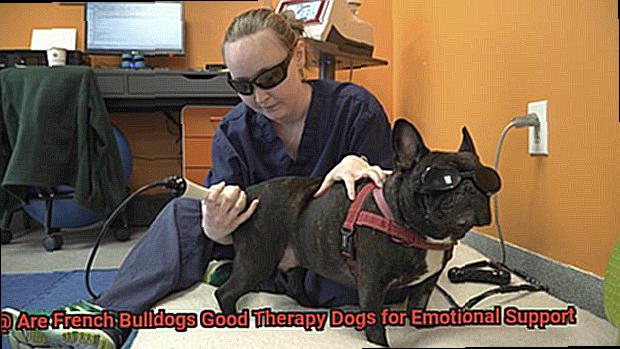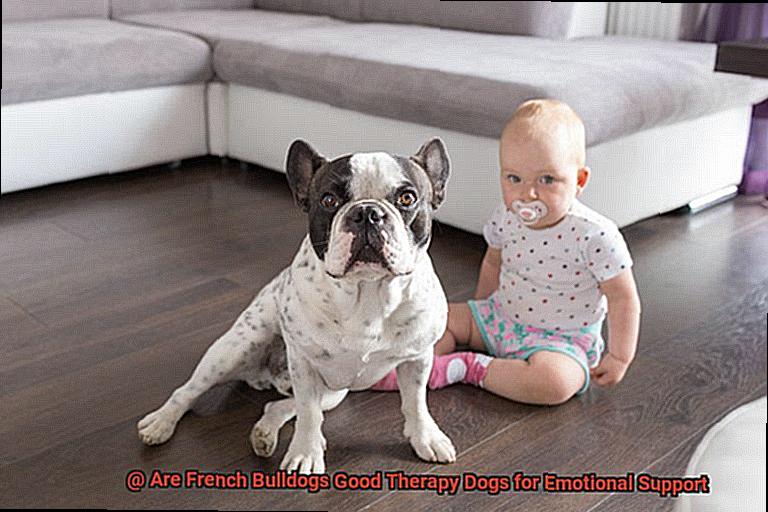Are French Bulldogs Good Therapy Dogs for Emotional Support?
Dogs have always been known to be man’s best friend, but did you know that they can also offer emotional support? Therapy dogs are specifically trained to provide comfort and companionship to individuals who are going through emotional distress. Among the popular breeds used for this purpose is the French Bulldog. But what makes them good therapy dogs for emotional support? The answer is simple – they are amazing.
French Bulldogs possess an irresistible charm with their squishy faces and friendly demeanor, making them perfect companions for those in need of emotional support. These furry friends have an innate ability to sense their owner’s emotions, which enables them to provide comfort and support when needed.
In this blog post, we will dive deeper into why French Bulldogs make ideal therapy dogs for emotional support. Not only are they intuitive, but they are also adaptable to different environments and require minimal exercise. Additionally, their unique physical features make them suitable for people with physical disabilities or limited mobility.
So whether you’re considering getting a therapy dog or just curious about French Bulldogs, this post is for you. We’ll explore the reasons why these pint-sized pups could be the perfect addition to your life. Get ready to fall in love with these adorable creatures.
Temperament of French Bulldogs
Contents

If you’re looking for a loyal and loving companion to provide emotional support, French Bulldogs should be on your list of breeds to consider. These adorable and friendly pups have a temperament that is ideal for therapy work.
French Bulldogs have a reputation for being affectionate and playful, making them great companions for emotional support. They are highly social animals and love to be around people, craving attention and affection from their owners. Their adaptable nature makes them suitable for various settings, including homes, hospitals, and nursing homes.
One of the reasons why French Bulldogs make great therapy dogs is their small size. They are compact and can easily sit on someone’s lap or be held close for comfort. This is especially beneficial for those who may be in a hospital or nursing home and cannot have larger dogs around them.
But it’s not just their size that makes them ideal companions for emotional support. French Bulldogs have an incredibly friendly temperament that is hard to resist. They are playful, love to cuddle, and have a great sense of humor, which can be incredibly soothing for someone who is feeling down.
French Bulldogs also have an innate sense of intuition when it comes to their owner’s emotions. They can pick up on subtle cues and respond accordingly, providing comfort and support in times of need. This is a valuable trait that is necessary for any therapy dog.
Another benefit of French Bulldogs as therapy dogs is their low exercise requirements compared to other breeds. They are perfectly content with short walks and play sessions, making them ideal companions for those who may have limited mobility.
Above all else, French Bulldogs are incredibly loyal to their owners and will do anything to protect them. This loyalty also extends to other people they meet, making them ideal candidates for therapy work. With proper training and socialization, French Bulldogs can provide comfort and joy to those who need it most.
Size of French Bulldogs
French Bulldogs may be small, but they are mighty in both size and personality. These furry friends typically weigh between 16-28 pounds and stand 11-12 inches tall at the shoulder. Their compact size and muscular build make them a breeze to handle and carry, making them an ideal choice for individuals who need a dog that is easy to transport or have limited mobility.

When it comes to living situations, French Bulldogs are perfect for apartment dwellers. Their small size means they can easily move around without taking up too much space. Although they may be relatively inactive indoors, Frenchies still require daily exercise to keep them healthy and happy. So whether it’s a quick walk or a game of fetch in the park, French Bulldogs are always ready for some fun.
Despite their small stature, French Bulldogs are not fragile dogs. They possess a thick, stocky build and strong bones that allow them to handle rough play with children or other dogs. This physical strength also makes them great therapy dogs for individuals who require some physical activity.
In conclusion, the size of French Bulldogs makes them a fantastic choice for those seeking a loyal and loving companion that won’t take up too much space in their home. They are easy to handle and transport, perfect for apartment living, and have the strength to endure rough play.
Intuitive Nature of French Bulldogs
French Bulldogs are more than just cute and cuddly pets. They possess an intuitive and empathetic nature that makes them exceptional therapy dogs for emotional support. These furry companions have an unparalleled ability to sense the emotions of their owners and those around them, making them a reliable source of comfort and solace for anyone going through a difficult time.
One of the most remarkable aspects of French Bulldogs is their heightened sensitivity. They can pick up on even the slightest changes in mood or behavior, giving them an almost uncanny ability to provide emotional support. This makes them ideal for people struggling with anxiety, depression or any other emotional issues, as they offer unconditional love and affection that can help lift one’s spirits.
French Bulldogs’ intuitive nature also extends to their ability to read body language. They can sense when their owners need extra attention or when they need space. This means they can provide comfort without being intrusive, which is particularly beneficial for people who may not feel comfortable discussing their feelings with others.
Moreover, French Bulldogs form deep bonds with their owners and are fiercely loyal and protective of them. This makes them an excellent companion for anyone seeking a sense of security and comfort in their lives. They will always be there to snuggle up with you when you need it most, providing a warm and loving presence that can help soothe your worries away.
In summary, French Bulldogs are remarkable therapy dogs because of their intuitive nature. Their ability to sense emotions, read body language and provide comfort and companionship is second to none. Their loyal and affectionate personalities make them ideal for anyone seeking a reliable source of emotional support.
Low Exercise Requirements of French Bulldogs
French Bulldogs are an adorable and affectionate dog breed that make excellent therapy dogs for emotional support. One of the reasons for this is their low exercise requirements, which make them an ideal breed for individuals who may not be able to provide a lot of physical activity for their furry companion.
So, what makes French Bulldogs unique in terms of exercise? Well, they typically only need short walks and playtime throughout the day to stay healthy and happy. This means that they are perfect for people who live in apartments or have limited outdoor space. They can get all the exercise they need just by playing around indoors or going for a quick stroll around the block.
French Bulldogs’ low exercise needs also make them suitable for individuals with disabilities or chronic illnesses that restrict their ability to take their dog on long walks or engage in strenuous activities. Even though they don’t require a lot of physical effort from their owner, French Bulldogs still provide emotional support and companionship.
However, it’s essential to note that even though French Bulldogs don’t require a lot of exercise, they still need regular activity to maintain their health and prevent obesity. Owners should provide daily opportunities for play and exercise, such as indoor fetch or short walks around the block.
In conclusion, French Bulldogs are an excellent choice for anyone seeking a therapy dog that can provide emotional support without requiring intensive physical activity. With their loving nature, intuitive personalities, and low exercise requirements, they make perfect companions for those looking for comfort and security.
Benefits of Having a French Bulldog as a Therapy Dog
French Bulldogs are a breed that is not only cute and cuddly but also perfect for therapy work. Their natural loving nature and calming presence make them ideal for those in need of emotional support. These furry friends are the perfect companions for therapy sessions, providing numerous benefits to those who need it most.
One of the most significant advantages of having a French Bulldog as a therapy dog is their calming presence. They have an incredible ability to reduce anxiety and stress in people, making them the perfect fit for therapy work. With their laid-back attitude, they can create a more relaxed atmosphere during therapy sessions, which can be incredibly beneficial to those struggling with emotional issues.
Another benefit of French Bulldogs as therapy dogs is their affectionate nature. They love nothing more than to snuggle up and provide comfort to their human companions. This can be especially beneficial for people who may be feeling lonely or isolated. Therapy dogs like French Bulldogs provide comfort and companionship, and they shine in this area.
French Bulldogs are also easy to train. They are intelligent and eager to please, making them quick learners. They can perform a wide range of tasks, such as retrieving items or providing physical support. This makes them valuable assets in any therapy setting.
Their small size is another advantage of having a French Bulldog as a therapy dog. Their compact size makes them ideal for therapy work in confined spaces such as hospitals or nursing homes. Furthermore, their size makes them easier to handle for individuals who may have mobility issues.
Finally, French Bulldogs have a playful side that can help uplift the mood of those around them. They love playing games like fetch or tug-of-war, which can be a fun way to engage patients during therapy sessions.
In conclusion, French Bulldogs are excellent therapy dogs due to their affectionate nature, calm demeanor, and easy-to-train personality. They provide emotional support, companionship, and a calming presence that can benefit people of all ages.
Tips for Training a French Bulldog as a Therapy Dog

It’s a wonderful goal, but it’s important to understand that it takes time, patience, and dedication. Here are some tips to help you get started on the journey of training your French Bulldog to become a successful therapy dog.
Start Early
The earlier you start training your French Bulldog, the better. This will allow them to develop good habits and behaviors that will make them successful therapy dogs. French Bulldogs can be stubborn, so starting training as early as possible can help establish good habits and make it easier for them to learn new commands.
Socialization

French Bulldogs are social animals and thrive on interaction with people. It is crucial to expose them to different people, places, and situations early on. This will help them become comfortable and confident in new environments and around new people.
Obedience Training
Solid obedience training is a must for all therapy dogs. Basic obedience commands such as sit, stay, come, and heel should be taught to your French Bulldog. This will help them follow commands from their handler and behave appropriately in public settings.
Positive Reinforcement
Using positive reinforcement techniques such as treats, praise, and toys can be helpful in training your French Bulldog. This creates a positive association between good behavior and rewards. Consistency is also essential in training, as French Bulldogs thrive on routine and structure.
Desensitization
Therapy dogs may encounter loud noises or sudden movements in their work. Desensitizing your French Bulldog to these stimuli can help prevent fear or anxiety in these situations. Gradually exposing them to new sounds or movements can be helpful.
Practice Handling
Therapy dogs may be handled by strangers during their work. It is important to practice handling your French Bulldog in different ways such as touching their paws, ears, and tail so they are comfortable with being touched. This will help them be more relaxed and calm during their therapy sessions.
Regular Exercise
Regular exercise is important for all dogs but especially for therapy dogs as they need to be in good physical condition for their work. Walks, runs, and playtime can help keep your French Bulldog healthy, happy, and ready for their therapy work.
Remember that not all French Bulldogs are suited to be therapy dogs.
While this breed can be loving and affectionate, some may not have the temperament or personality for this type of work. It is essential to assess your individual dog’s abilities and personality before pursuing therapy dog training.
Conclusion
In conclusion, French Bulldogs are fantastic therapy dogs for emotional support. Their friendly nature, small size, intuitive abilities, low exercise requirements, and numerous benefits make them ideal companions for those in need of emotional support. With their affectionate and playful personalities, they quickly become beloved friends to their owners.
French Bulldogs have a unique talent for sensing their owner’s emotions and providing comfort when needed. They can adapt to different environments and require minimal exercise, making them suitable for various settings. Additionally, their physical features make them perfect for people with physical disabilities or limited mobility.
To train a French Bulldog as a therapy dog requires patience, dedication, and consistency. Early socialization, obedience training, positive reinforcement techniques, desensitization practice and regular exercise are critical steps in the process. However, it is essential to evaluate your individual dog’s abilities and personality before pursuing therapy dog training.




